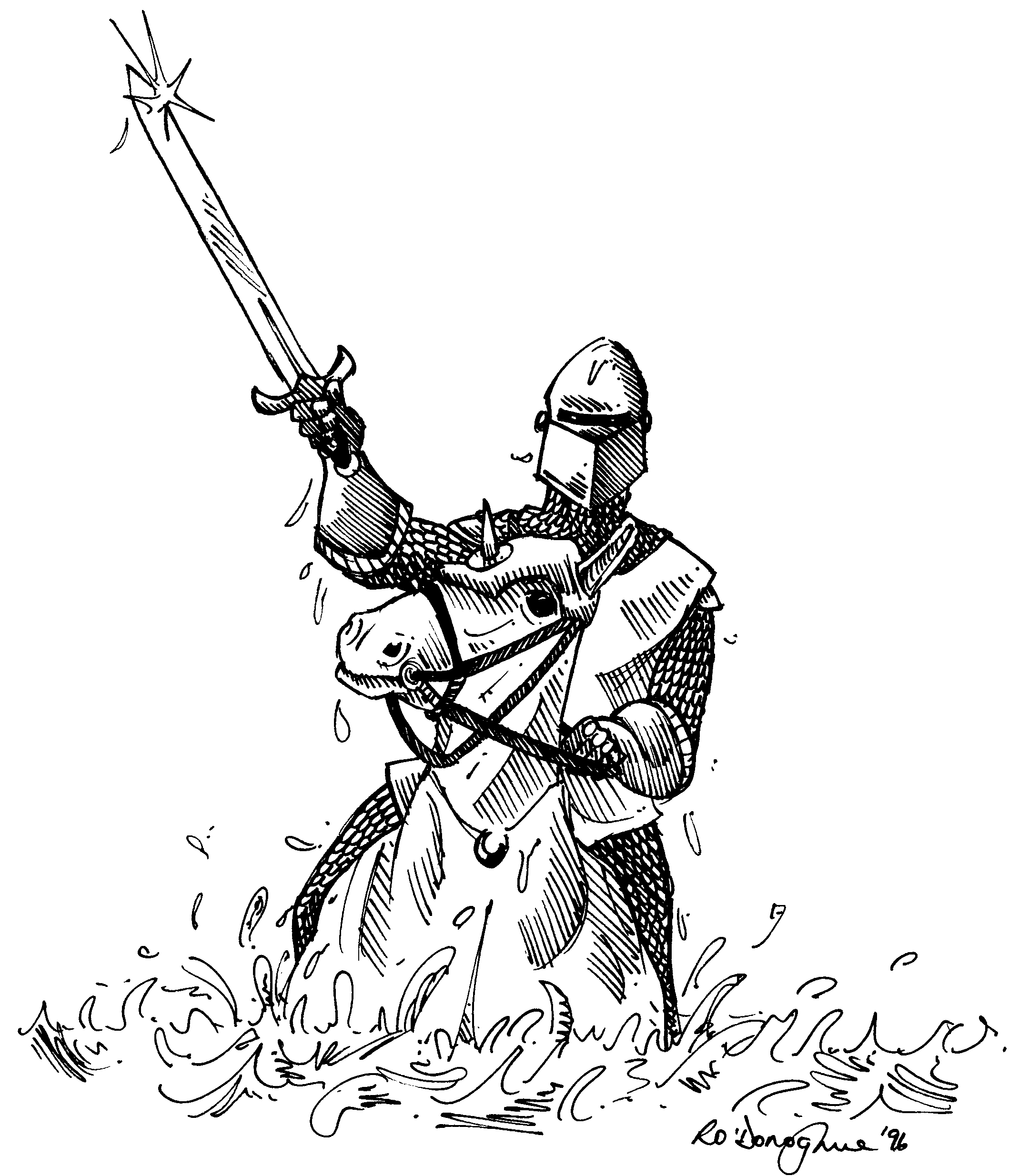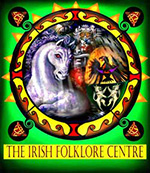The Legend of O’Donoghue Background There are a great many tales about Dónall Ó Donnchú or Daniel O’Donoghue, who, some say, was a twelfth century chieftain and the grandson of the Donogh from whom the O’Donoghue name was taken. The Legend The Lower Lake of Killarney is 5mls long and has a mean breadth of one mile and a half.
The water of the lake is in many parts very deep and tolerably clear. Concerning this Lough Lein, as the lake was anciently called, there is a legend, that of “O’Donoghue and his White Horse”, which legend surpasses all others current in that stronghold of tradition, the South of Ireland. O’Donoghue is the name of an Irish prince, who is supposed to have ruled over Killarney and the country round, in an age so remote as to be beyond the bound of historical research; or, as his countrymen say, “he lived so long ago that the precise year of his birth cannot now be satisfactorily ascertained”. He was both brave and good, in an eminent degree; indeed his warlike prowess was only equalled by his domestic virtues. That some such personage did once reign over this favoured district is a circumstance not at all improbable; and indeed, the unvarying testimony of tradition may be taken as proof positive of the fact.
“The great O’Donoghue”, says a writer of the last century, “the hero of this great race, still survives in the praise of his countrymen, who set off his virtues in the highest colours. They represent him almost a god; a despiser of danger, a sworn foe to oppression, a warm admirer of all that is great and honourable, a rigorous upholder of law and order, hospitable to all. The prince was the father of the country, his court the seat of joy and festivity. Worth, not birth, took high place, grey hairs received their due reverence, and the innocent and downtrodden were always upheld and revenged.
This prince was wise too, and the gods sped his councils for his subjects were happy. In that golden age the lands were fruitful, seasons mild, and the people ever grateful. Nor was their patron unpropitious, for death seemed to rekindle his love; and still he reigns to bless his ancient people, who hold themselves indebted to his protection for every gift of fortune. Often as the hind returns to his cottage he sees by the moon’s pale light, the good old king, amidst a train of his attendants, his silver locks floating in the breeze, and he, clothed in royal robes seated on a milk-white courser. Such a vision is considered the happiest omen of good, and is spoken of with delight. The O’Donoghue is the Hercules and Quirinus of this ancient people. The tribute of the kings of Munster to this prince in the olden time was ten dun horses, ten coats of mail and ten ships. This gives us the idea of a powerful chieftain, possessed of a navy in those days truly formidable. The end of this chieftain was singular and mysterious. At one of those splendid feasts, for which his court was so famed, surrounded by the most noble of his subjects, he was engaged in a prophetic relation of the events to come in after ages. His auditors listened – now wrapt in wonder, now fired with indignation, burning with shame, or melted into sorrow, as he faithfully detailed the heroism, the injuries, the crimes, and the miseries of their descendants. In the midst of his predictions he rose slowly form his seat, advanced with a solemn, majestic and measured tread to the shore of the lake, and walked forward composedly on its unyielding surface. When he had nearly reached the centre, he paused for a moment, them turned slowly around, looked towards his friends, and moving his arms to them with the cheerful air of one taking a short farewell, disappeared from view. “Once on a day distinguished from the rest, Some years were passed, when as the usual day Surrounded by his subjects at the feast, Of solemn mourning brought them forth to pay Cheerful he sat, and in prophetic rhymes, The tribute of their tears: with streaming eyes Darkling rehearsed the fate of future times They called on Donoghue to hear their cries, When more refined the wide extended globe Implored the dire abyss in piteous strain, Should change the face and wear a brighter robe To give them back their Donoghue again; To silence shrunk, and grief itself was spent When curious guests should travel far from home To sail his lakes and o’er his mountains roam.
Unceasing till their wild and sore lament While from his tongue divine prediction flowed Soft at the solemn interval, the sound And firm belief in every bosom glowed, Of airs celestial filled the space around. Sudden he rose, and to the gazing throng, The hills, the dales, the shores began to smile, As some light vision seemed to skim along And ten-fold brighter shone the Royal Isle; The neighbouring lake; wide op’d his willing wave, The sylvan songsters warbled from each spray, And quick received him in a crystal grave. The waters blushed, as at the end of day. But O! what plaintiff numbers can express Thunder at length the awful signal gave, Their doubt, their wonder, and their wide distress? A form all-glorious started from the wave, Fears without hope and sorrows wirh end, On graceful courser by a princely train At once bereaved of monarch, father, friend. Of guards escorted o’er the grassy plain. ‘Twas Donoghue!” This was O’Donoghue’s first reappearance on earth; but the visit was often reported in following years, when the spirit of the hero was supposed to have been seen, on the morning of May Day,  gliding over the lake on his favourite white horse, to the sound of sweet unearthly music, and preceded by groups of youths and maidens, who flung wreaths of delicate spring flowers in his path. The tale of O’Donoghue’s disappearance and reappearances is most steadfastly believed by many of the people round the lakes, and some most solemnly affirm that they have seen him. According to the popular creed, it was not the good fortune of everyone to see the prince when he did revisit his ancient domains; those who were lucky enough to catch a glimpse of him were sure to be prosperous and happy in the world. Whenever he was seen by a number of persons at a time, an abundant harvest was sure to be the result. But “Too long an absence now the natives mourn And annual supplicate his blessed return; Oft as he deigns a visit, they behold Their flock increase, their harvests wave with gold,” Some years have elapsed since the last appearance of O’Donoghue. That year the month of April had been wild and stormy, but May morning broke calm and bright. The air so lately filled with howling tempests, was hushed and still and the lake was calm and smooth as a sheet of glass. Suddenly as the sun rose an enormous white wave rose at the east end of the lake, and darted across the water to Tomies Mountain. Behind this wave appeared a stately warrior on a milk-white steed; his snowy plume fluttered on a helmet of polished steel, and he wore over his left shoulder a light blue scarf. The horse, as if proud of his noble burden, sprang forward along the firm water, right behind the wave, and at every bound dashed up showers of glittering spray, sparkling in the sun. The warrior was O’Donoghue; he was followed by a band of maidens and youths, linked together by chains of flowers, and moving softly across the lake like moonlight fairies, to the sound of soul-stirring music. Thus the prince and his train danced along the shores, and nearly encompassed the lake. Then the morning mists gradually enveloped them, but the sound of their music still lingered in the air, and who, catching up the harmonious strains, repeated them softly till the last faint sounds died away, when the enchanted mortals who had seen and heard all, woke as from a dream of bliss.
gliding over the lake on his favourite white horse, to the sound of sweet unearthly music, and preceded by groups of youths and maidens, who flung wreaths of delicate spring flowers in his path. The tale of O’Donoghue’s disappearance and reappearances is most steadfastly believed by many of the people round the lakes, and some most solemnly affirm that they have seen him. According to the popular creed, it was not the good fortune of everyone to see the prince when he did revisit his ancient domains; those who were lucky enough to catch a glimpse of him were sure to be prosperous and happy in the world. Whenever he was seen by a number of persons at a time, an abundant harvest was sure to be the result. But “Too long an absence now the natives mourn And annual supplicate his blessed return; Oft as he deigns a visit, they behold Their flock increase, their harvests wave with gold,” Some years have elapsed since the last appearance of O’Donoghue. That year the month of April had been wild and stormy, but May morning broke calm and bright. The air so lately filled with howling tempests, was hushed and still and the lake was calm and smooth as a sheet of glass. Suddenly as the sun rose an enormous white wave rose at the east end of the lake, and darted across the water to Tomies Mountain. Behind this wave appeared a stately warrior on a milk-white steed; his snowy plume fluttered on a helmet of polished steel, and he wore over his left shoulder a light blue scarf. The horse, as if proud of his noble burden, sprang forward along the firm water, right behind the wave, and at every bound dashed up showers of glittering spray, sparkling in the sun. The warrior was O’Donoghue; he was followed by a band of maidens and youths, linked together by chains of flowers, and moving softly across the lake like moonlight fairies, to the sound of soul-stirring music. Thus the prince and his train danced along the shores, and nearly encompassed the lake. Then the morning mists gradually enveloped them, but the sound of their music still lingered in the air, and who, catching up the harmonious strains, repeated them softly till the last faint sounds died away, when the enchanted mortals who had seen and heard all, woke as from a dream of bliss.
Author name: Rod O’Donoghue
Email: rod@odonoghue.co.uk

Hello Rod.
Thank you for this post. My father told me of the legend of O’Donoghe my years ago and it has always intrigued me. I have visited a County Kerry and graveyard where my ancestors are buried and also a farm in a very small place called Mean Togues going back several generations of O’Donoghue.
I have entertained the the idea of being decended from such an ancestor for many years and eventually wrote and recorded a song about this legend, warrior prince, with my husband.
If you would like to hear the song I wrote about O’Donoghe you an check it out on the website below. It is called Warrior Prince.
A little tribute to a great ancient.
Great to hear from you, Clare, and some really good music. Warrior Prince is great
I have never heard of Mean Togues – where is it?
I will put your post up on The O’Donoghue Society site if you are happy with that
Cheers
Rod
Rod O’Donoghue
Author of ‘Heroic Landscapes: Irish Myth and Legend’ and ‘O’Donoghue People and Places’
Founder of The O’Donoghue Society and The Irish Folklore Centre
https://www.odonoghue.co.uk and http://www.irishfolklorecentre.com
Email: rod@odonoghue.co.uk
Family history: https://ballyduffodonoghue.blogspot.co.uk/